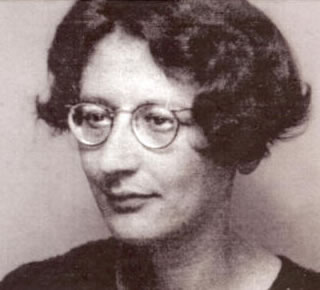 In 1943, the French philosopher Simone Weil (pronounced Vey), starved herself to death.
In 1943, the French philosopher Simone Weil (pronounced Vey), starved herself to death.
With her family and friends in close proximity and plentiful food at hand, she decided to stop eating. And at the age of 34, she died — not in a Nazi camp and not because there was no food. But because she had decided to to stop eating in solidarity with the millions of people being persecuted by the Nazis.
Last week at the Ojai Music Festival, I heard a haunting and beautiful piece of music by the Finish composer, Kaija Saariho. But as I think back on the event, something else stays with me.
In a pre-show concert discussion, the remarkable opera director, Peter Sellars, discussed Weil’s book, Gravity and Grace. He said that it’s not like a novel — a book that you enjoy racing through to get to the end — but rather like a religious text in which one phrase read again and again might change your life.
A Phrase Can Change Your Life
The idea that one phrase or idea might change my life caught my attention. Mr. Sellars spoke about Ms Weil’s decision to stop eating as a radical example of caring deeply about people one doesn’t know personally while at the same time being cruel and uncaring to those to whom one is closest.
As Ms Weil starved herself to death, she dismissed the feelings of her friends and her parents and the intimate friends who loved her. She disregarded their pleas for her to choose to live.
While caring deeply about millions of people she didn’t know, she was deeply cruel to those people close to her.
The idea that we can be kind to those we don’t know and cruel to those we do sticks with me now.
Being Kind to Strangers
I often find it easier to be kind to the strangers I meet at St Mary’s Park where I exercise in the mornings than to the people who are the closest to me.
The morning after I heard Mr. Sellars’ talk about Simone Weil, I decided to do my very best to treat those close to me with at least as much caring and kindness as I treat those I don’t know.
I keep turning this idea over in my mind, like a phrase in a religious text that has the potential to change my life.
Being Kinder to Those You Love
Can you be at least as kind to people you know well as you can be to those you don’t know at all?
To be kind is not just to use pat phrases or empty smiles.
Being kind requires being appreciative of the needs and desires of others. It requires that you appreciate rather than condemn the reality of others. Above all, it involves:
- noticing rather than dismissing;
- sharing rather than withholding;
- and connecting rather than drawing apart.
The Consequence of Kindness
I have a secret to share with you…
Since I’ve started being kinder to those closest to me, I actually love my husband a bit more! Amazing what happens when I stop rolling my eyes or asking him to do things in a snarky way! (I wonder if he’s noticed the change. I certainly have!)
Be Kind to Those Closest to You
Pay attention this week to your patterns of kindness. Are you friendlier, less judgmental, and more appreciative of people you don’t know so well than to those who are closest? You might be surprised by your patterns.
Try to moderate the common gestures of impatience you may use with your loved ones. Stop rolling your eyes or framing requests negatively. Try treating them in the way you would a stranger, when you’d be more inclined to be polite. Notice what happens.
Share any revelations (I expect no less) in the comments below. Or, take your kinder, gentler self over to Facebook and share your experience there.
Image credit: Wikipedia / Creative commons license
